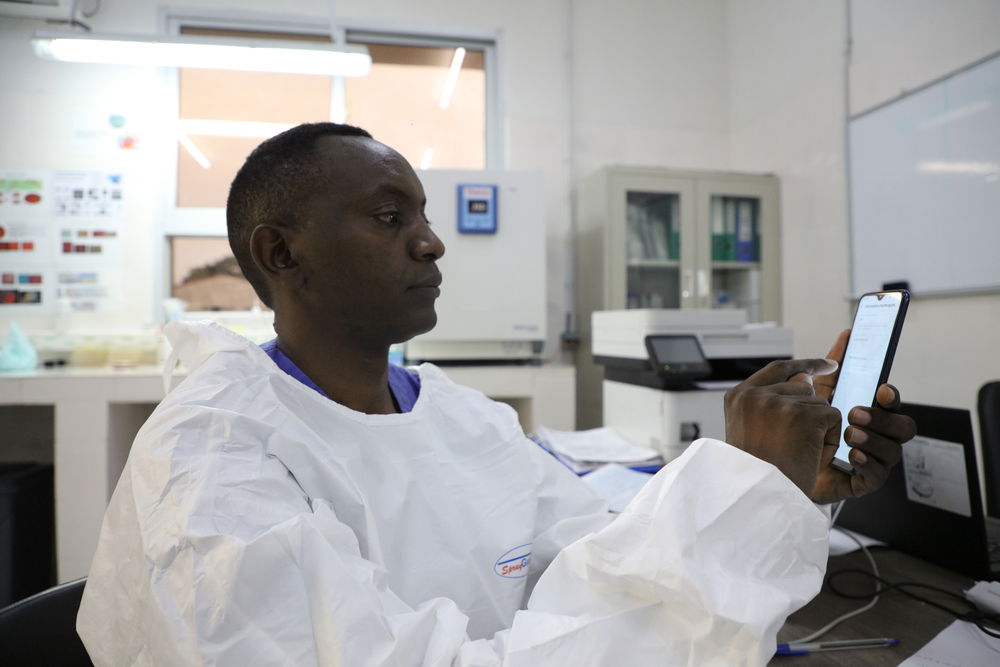Responding to the global health emergency of antibiotic resistance, the MSF Foundation is taking action and providing a concrete response that can be used immediately in low- and middle-income countries.
● 1.27 MILLION1: the number of deaths worldwide in 2019 related to antibiotic resistance
● 10 MILLION1: the number of annual deaths worldwide by 2050 if nothing changes
● More than half of all antibiotics are used inappropriately
● 400 YEARS: the number of years it would take sub-Saharan Africa to reach the same ratio of pathologists, including microbiologists/population as in the United States or the United Kingdom
According to the WHO, antimicrobial resistance (AMR) is one of the most pressing public health threats in our time. Health authorities estimate that more than half of all antibiotics are used inappropriately, mainly in many low- or middle-income countries (LMICs). AMR cannot be measured in these countries due to a lack of technical and human resources to detect and monitor it. Consequently, it is imperative to find rapidly deployable responses to address the health emergency and halt the spread of AMR.
MSF Foundation is developing Antibiogo, the first CE-marked, in vitro medical device designed, developed and tested for and with LMICs. This tool, which is a reading application (or app), makes it possible to interpret antibiograms and give a reliable and practical response to ensure the safe prescription of antibiotics. “With Antibiogo, any microbiology laboratory technician, anywhere in the world, will be able to read and interpret an Antimicrobial Susceptibility Test (AST) directly on any phone and know the resistance profile of the bacteria responsible for patient infection,” explains Dr. Nada Malou, head of the Antibiogo programme, MSF Foundation.
The fight against antibiotic resistance is based on a multidisciplinary response with correct diagnosis being an essential pillar.
Before initiating antibiotic treatment, pathogenic bacteria need to be clearly identified and tested for susceptibility to antibiotics. In this case, a sample should be taken from the patient, bacteria are identified, and an AST is performed. In high-income countries, antibiotic prescription is facilitated by the use of automated systems to read and interpret AST, and by the expertise of microbiologists. But in LMICs the lack of equipment, clinical microbiologists, and training makes the test interpretation much more complicated and often absent. Consequently, AST is often misinterpreted, and this has been evident in the 70 countries in which MSF operates. Patients are frequently seen arriving in hospitals with bacterial infections which do not respond to antibiotic treatment.
To help doctors in LMICs prescribe the most effective antibiotics for their patients, MSF Foundation has created a tool that can interpret photos of AST.
Safe and reliable interpretation of AST thanks to a groundbreaking app: Antibiogo
Antibiogo is a diagnostic tool enabling non-expert laboratory technicians to measure and interpret AST. It is based on image processing, artificial intelligence technology, and an expert system that simulates a specialist's knowledge.
In practice, the app enables laboratory technicians to measure inhibition zone diameters, and then interpret the results without requiring any expertise in microbiology. In the field, the results show a very high level of concordance, ranging from 90–98 % depending on the bacteria, when compared with an interpretation carried out by qualified microbiologists. Non-expert laboratory technicians working in LMICs are now able to measure and interpret AST to provide accurate results.
A great hope for slowing antibiotic resistance in LMICs
Antibiogo is a free downloadable app that provides a concrete response to slowing AMR in all countries by facilitating access to quality bacteriological diagnosis. The results can also be used for monitoring purposes and to update empirical treatment based on actual etiology.
The Antibiogo app is being implemented in several MSF laboratories, including Jordan and Kinshasa DRC and by December in Mali, the Central African Republic and Yemen and is intended to be deployed more extensively. With time, the app will be a tool for healthcare professionals in all LMICs.
About the Antibiogo programme
MSF Foundation has set up a consortium with a French university hospital and several academic research centers to produce a proof of concept to respond to the issue identified. They were assisted in 2019/2020 by a 15 Google.org volunteer developers and were granted a software license from a specialist microbiology company, i2a, to help them move from concept to product. MSF Foundation was supported by legal, ethical, epidemiological, and regulatory specialists to make this free in vitro diagnostic app available to as many people as possible.
For more information about Antibiogo: https://fondation.msf.fr/fr/projets/antibiogo



